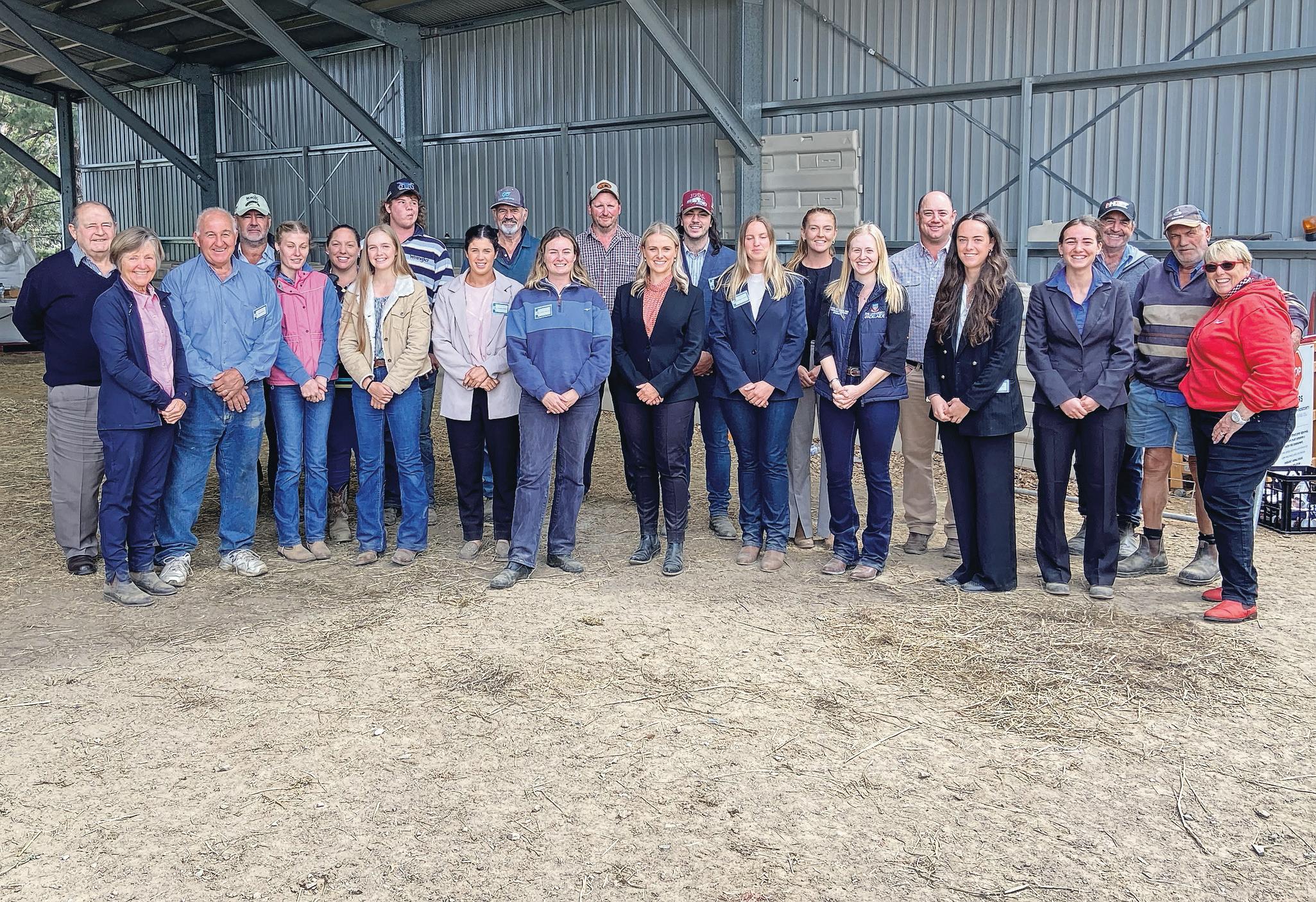


































































AUTUMN CALVING is well under way at the Suares farm, with the usual business and extra workload that entails.
Thinking back over the years, and the excitement another heifer calf born onto the farm always provided, it occurs to me how rapidly things have changed.
These days, we just assume every Holstein calf is a heifer and are somewhat perplexed when that doesn’t happen.
During March we attended the Herd23 Conference in Bendigo, and I was invited to facilitate the Ginfo Forum which runs immediately preceding the conference for farms involved in the Ginfo Project — a great chance to catch up with other like-minded, data driven farmers.
Discussed at the forum, and since implemented by Datagene, farmers can now add their dairy/beef cross calves to their herd recording software program, thanks to the addition of 200 beef bulls to the National AI Sire Identification System.
This will be an important step in improving traceability and return on investment in the dairy/beef market, as we grapple with solutions to the bobby calf issue and sustainability.
I’ve entered our first beef calf for the year into our Mistro program, and it worked.
After doing some fabulous work in the workforce attraction space, we are delighted that Sam Andrews has taken on the new Farm Engagement lead role.
WestVic welcomes Jacinta Langdon to the team as our new Workforce Attraction staff member.
Jacinta is well known in the region and comes with a wealth of experience in the agri sector — and we sincerely hope she enjoys her new role.
We have been using many opportunities and platforms to garner feedback for the next strategic plan, which will be finalised before the next AGM.
The inevitable and ultimate flow-on of falling milk production will be reductions to the budgets of all RDPs.
The WestVic Board is focused on ensuring the delivery of programs that best meet the needs of this region’s farmers and ensuring the programs are those you have indicated are most valued.
Thank you to those who have contributed to the conversation in this area.
In April, while our milking numbers were low and before the mayhem of calving began, we took a road-trip up to the Southern Highlands region of NSW, an area we had never visited and can highly recommend.
On our way home we swung through Canberra so that I could attend the ‘Celebration
Two south-west Victorian dairy farmers have been honoured for their contribution to the industry.
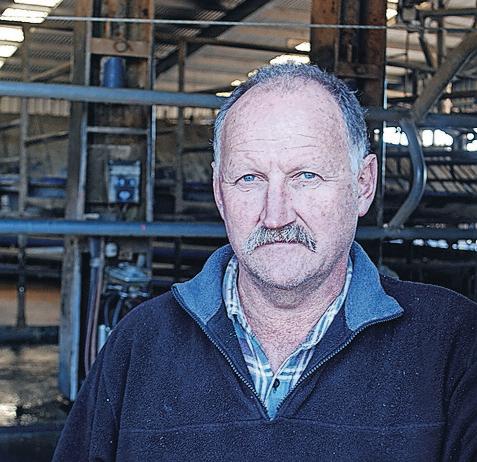

John Dalton and Andrea Vallance were announced as the 2023 Dairy Honour Board inductees during WestVic Dairy’s Dairy NiteMooves at Noorat on May 24.
The judges said Mr Dalton and Mrs Vallance were recognised for their outstanding commitment to the industry and local community.
Mr Dalton, from Naringal, has a long history of involvement with the dairy industry, including the Regional Education Advisory Committee and the WestVic Dairy board.
Mrs Vallance, who farms at Nirranda, is coordinator of the Timboon Agriculture Project, chair of the DemoDAIRY Foundation, and has roles on Nurture Food and Fibre Great South Coast Committee and the Neil Porter Legacy Industry Sub Committee (see story, page 4) .
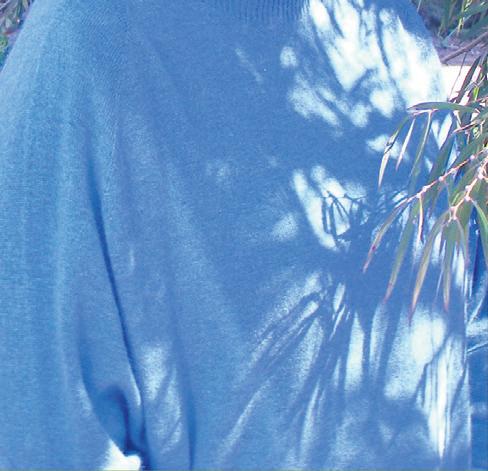
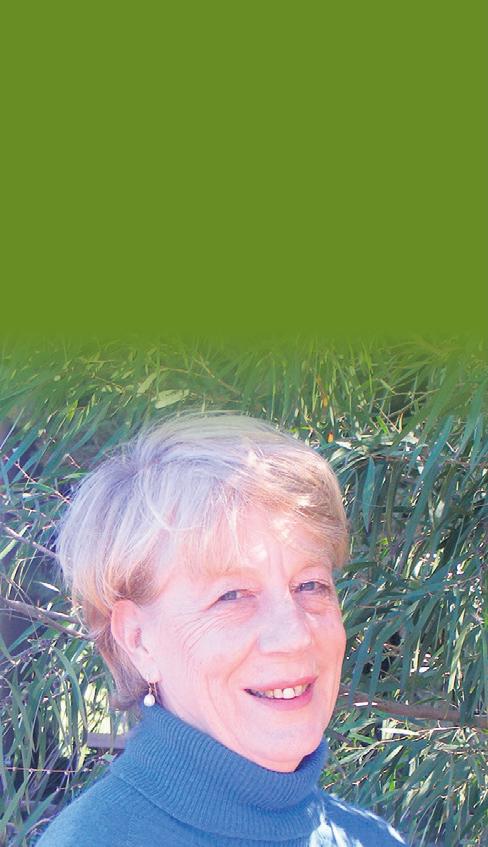
WestVic Dairy chair Jacqui Suares opened the evening at the Noorat Recreation Reserve that also included announcement Farm Photo Award winners. Lachlan Tindall took out the top spot for the Farm Photo Award with Sarah Jane Rea awarded the runner-up prize.
MC Tom Newton from MaxCare interviewed a panel of three past Great South
West Dairy Awards winners.
Jorge Massa (2017 Employee of the Year), Kevin Wines (2018 Farm Business Manager of the Year along with his wife Claire) and Mark Billing (2022 Honour Board inductee) shared their experiences applying for the awards and provided an insight into what they’ve been up to since their wins.
Former Geelong Cats football star and media identity Cameron Ling was keynote speaker, inspiring the audience with his message of effective leadership on and off the field.

of Australian Dairy’ function at Parliament House, representing WestVic Dairy. There were a number of farmers from the Western District in attendance representing various industry bodies and it was a great opportunity to showcase the dairy industry, highlight the importance of dairy to regional areas and the national economy — and an opportunity to drive home important messages to politicians and their advisors. Housing, workforce, sustainability, biosecurity — the list goes on — but it was a wonderful example of industry working proactively and constructively together for the greater good.
Jacqui Suares WestVic Dairy chair Sarah O’Brien (deputy chair GippsDairy), Andrew Tyler (chair Murray Dairy), Kate Gofton (chair Dairy Tas), Andrew Cavill (chair Dairy SA and Jacqui Suares (chair WestVic Dairy) at a celebration of dairy event in canberra in March. Former Geelong Cats football star and media identity Cameron Ling was keynote speaker at WestVic Dairy’s Dairy NiteMooves at Noorat on May 24. John Dalton and Andrea Vallance were announced as the 2023 Dairy Honour Board inductees.KOROIT
Noah Billings never expected to find himself working on a dairy farm.
While Koroit is surrounded by prime dairy country, Noah was a town lad and had little cause to visit a farm.
However, a chance conversation with a cricket teammate sent him to a calf shed three years ago and he’s never looked back.
With support from a DemoDAIRY Foundation scholarship, Noah is now working with Eddie and Lisa Dwyer at their Purnim farm.
He has progressed from feeding the calves on Saturday mornings through a school-based apprenticeship to working full-time and completing his Certificate III in agriculture.
While his former school mates eyed careers in all other directions, 17-year-old Noah said he had found his niche and planned to continue working in the dairy industry.

“A friend I played cricket with asked me if I wanted to come out here on Saturday mornings and help with the calf feeding and it all went from there,” Noah said.
“I’d just feed the calves and do random jobs on Saturday morning and then go and play cricket or football.”
His friend no longer works on the farm but Noah was keen to progress in the industry.
“Eddie and Lisa asked if I wanted to go on a school-based traineeship. That was Mondays on the farm and I’d go to South West TAFE on Thursdays. Then when I finished Year 11,
I started full-time last October and I’m now doing my Certificate III.”
While admitting being a bit nervous around the big Friesian cows when he started, Noah now feels at home working with the livestock.
“I like being outside and doing something different every day, everything from fencing
and tractor work to feeding the calves and milking,” Noah said.
“Eddie is great and I’m learning a lot.”
“Mum and dad drive me to work every day, which they don’t mind, but I’m looking forward to getting my licence.”
Noah is happy to recommend other young people look at a career in agriculture.
Bulla is an Australian made and owned business which has been around for over 110 years and our strategy is simple, to create a sustainable family business for generations to come.
At Bulla, we are extremely proud of the exceptional quality of the milk supplied by local Victorian farms which enables us to bring award-winning dairy products to tables across Australia.

To support Bulla’s continued growth from new products we have an opportunity for a number of farms to join the Bulla family as milk suppliers. We invite interested suppliers to contact one of our field officers to discuss your milk supply profile and Bulla’s milk contract.
Features of Bulla Milk Supply Contracts
• Simple flat payment model for better cash flow in spring & easier annual planning
• A history of prices to our suppliers that are above market average
• No stop charge, volume charge or milk collection fee
• A guaranteed minimum price each year, no step downs
• Step up reviews during the year
To register your interest go to www.bulla.com.au/farmers
If you have any questions, please contact FieldServices@bulla.com.au
Contact our field team for information:
He said the DemoDAIRY Foundation was a big help in not only subsidising his study and purchase of work gear, but in giving him encouragement to pursue a career in agriculture.
People interested in careers in agriculture and who would like to find out about available scholarships, visit: www.demodairy.com.au
THIRTY YEARS after her first tentative foray into the dairy industry, Andrea Vallance is still paying it forward to thank those who helped her find her feet.
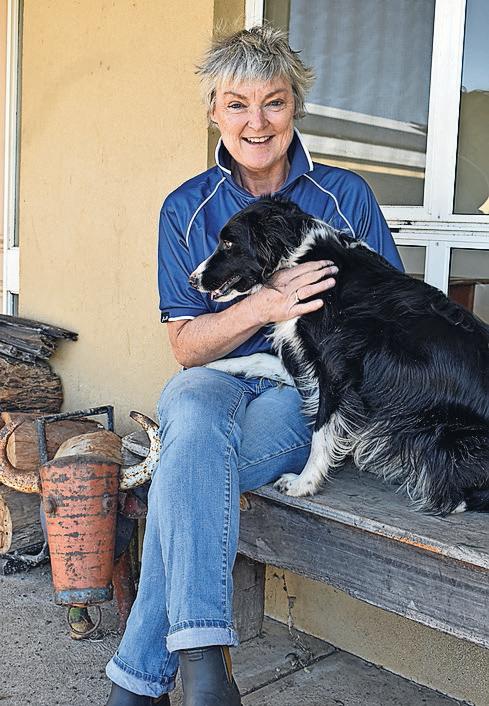
Andrea and her husband Bruce had no dairy experience when they started back in 1993; Bruce was from a sheep, cropping and pig farming background, Andrea a teacher who grew up in Warrnambool.
They haven’t forgotten those who helped steer them in the right direction.
Today, Andrea “pays it forward” as the co-ordinator of the Timboon Agriculture Project, DemoDAIRY Foundation chair, and with roles on Nurture Food and Fibre Great South Coast Committee and the Neil Porter Legacy Industry Sub Committee.

Since 2008 she has been a member of the Nullawarre Community Emergency Response Team and is an Ambulance community officer at Timboon.
“We knew nothing when we started but we were like sponges and soaked up everything we could seeking advice from other people,” she said.
“The people and the industry have been good to us and it’s important to give back.”
Andrea and Bruce met while she was teaching at Lake Bolac. They moved to Bendigo where Bruce managed a piggery, while Andrea taught at Maryborough.
After imports hurt the pig industry, they took a chance to lease a dairy farm milking 160 cows at Mepunga in 1993.
“One of the terms of the lease was that we had to join a grass budgeting group,” Andrea said.
“The Mepunga group included Barry Smith and Graeme Croft, really good farmers and great mentors. You find that people who are good at what they do are normally very happy to share their knowledge, and they can be prepared to share their mistakes and caution you about what not to do.
“Bruce and I are great believers in discussion groups and being mentors — you have to pay it forward.”
Within two years they had bought a 64ha dairy farm at Nirranda and were milking 130 cows.
“Because we had little or no money, we had to constantly check our figures, budget the whole time and really know the levers of our business,” Andrea said.
“We still do business with some of the same people we started with. It’s all about relationships, seeking advice from good operators or consultants like John Mulvany and building a capable team around you.”
Between 1998 and 2021 they built a herringbone dairy, then a rotary dairy and purchased more land, increasing cow numbers to 800 milkers off a 286ha milking platform with 566ha in total including out paddocks.
They milk a three-way cross of Friesians, Monbéliardes and Swiss Reds using a split calving system.
“We started with a Jersey-Friesian cross but evolved for more size and capacity, fertility and hybrid vigour,” Andrea said.
“We don’t want show ponies, we want work horses and they walk well, the fertility rate is high and they graze effectively. It’s a healthy, productive herd.”
More than 60 per cent of the diet is homegrown feed.

Andrea and Bruce try to take risk out of the business as much as possible. They have a grain storage facility at Hexham, irrigation with water monitoring in place to ensure it isn’t wasted, and have installed variable rate irrigation on the pivot — using soil texture maps which allows more efficient and strategic use of water with five different zones receiving different amounts.
There are solar panels at home and on the dairy, and collars on the cows to check their rumination, health and fertility.
In 2013 they purchased a dairy farm in Cobram in an equity partnership milking 600 cows.
It ceased milking in 2018 and the two remaining blocks are leased to a solar company. They are in the process of wrapping up that property.
In 2019 Andrea and Bruce included Nirranda farm manager Isaac Fynn in an equity partnership model after the successful experience in Cobram.
Bruce and Andrea own the land and water and Isaac has bought into the operational part of the business, the cows and equipment.
Their three children have bought in as well.
“Our veterinarian daughter, Jordy, has returned home to join the equity partnership with a future managerial role evolving as part of our succession planning,” Andrea said.
“We had to come up with different ways to look at sustainability and succession.”
Two staff will also buy into the equity system.
“You’ve got to acknowledge how people contribute to your business and it’s great when they have skin in the game too” Andrea said.
Throughout the farm’s evolution, Andrea has remained committed to her community.
The Timboon Agriculture Project is a partnership between Timboon P-12 School and the local community and industry, to provide hands-on engagement opportunities for students.
“Now in its 11th year, it has been a partnership game changer in education,” Andrea said.
More than 566 people have worked with students, provided teacher professional development and hands-on experiences since it began in mid-2012.
Andrea still gets a buzz out of introducing students to the potential of agriculture and helping make curriculum connections.
“Colleagues tell me I get a look on my face when I see that a student or teacher gets it,” she said, “that ‘aha’ moment”.
“TAP results have spread right through the community and it has won awards and influenced government policy.”
Andrea was also invited on to the DemoDairy Foundation board because of her experience in the dairy industry, education, and the TAP approach to pathways and career opportunities.
Wearing three hats as a farmer, ambulance volunteer and an educator, Andrea recognises farm safety as a priority and has worked with Dairy Australia, VFF and educators to provide resources and messaging to help keep farm families safe.
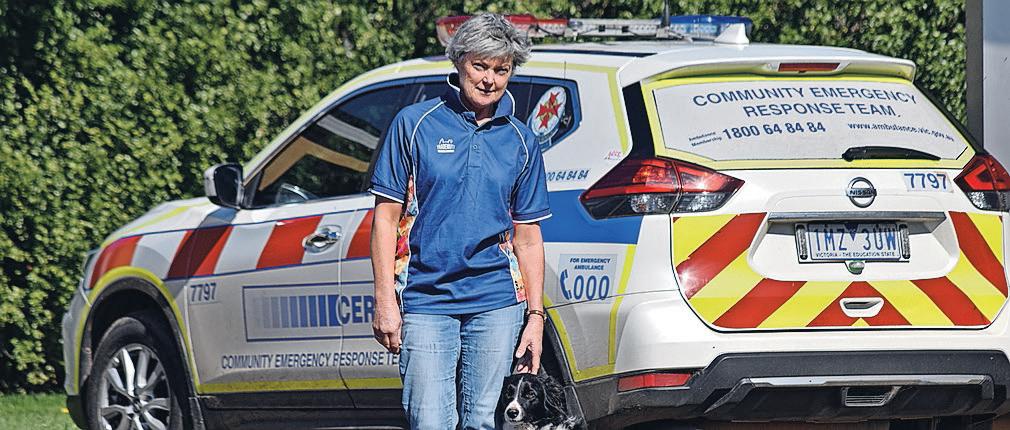

“We want our team members to go home safely to their families each night with physical and mental health both important.”
That concern about mental health has prompted Andrea and Bruce to support TradeMutt, gifting shirts to the team to encourage conversations around mental health and wellbeing.
Andrea (pictured) and her husband Bruce have never forgotten the help they received when they started in dairy and today try to “pay it forward”. Andrea exposes students to agriculture as part of the Timboon Agriculture Project. Since 2008 Andrea has been a member of the Nullawarre Community Emergency Response Team and is an Ambulance community officer at Timboon. The farm has a three-way cross of Friesians, Monbéliardes and Swiss Reds.HAYDEN AND Sheree Ballinger’s farm at Naringal is home to a lot more than cows.

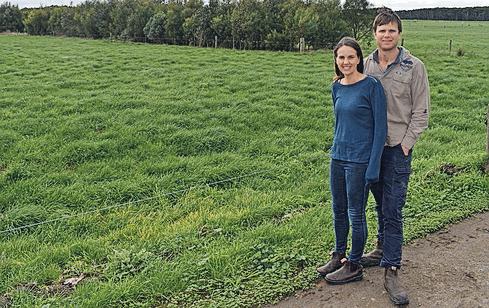
On a picturesque isolated out-paddock, the farm also hosts a retreat for parents who have experienced loss.
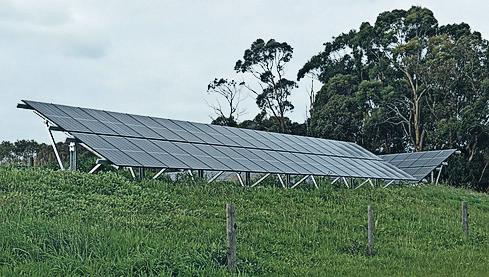
The retreat, the only one of its type in Australia, is close to their hearts and is giving families a chance to take a breather to cope with their grief.
Hayden and Sheree have personal experience of loss and built the retreat and created the Forever Held Foundation to run it.
They still love making a good living from the farm, but it’s clear the retreat is something special to them, and the hundreds of parents who use it for free.
Sheree and Hayden experienced five miscarriages. Their most recent miscarriage was in May 2018 when they lost Jamin at 18 weeks.
“We had so many layers of grief underneath from our previous losses that the grief hit really hard and I sunk very low,” Sheree said.
“In the months that followed, I would run or walk down this road, often crying. It was my therapy.”
It was during one of those runs that the inspiration for the retreat was born.
The 23-hectare block was the first bit of land they’d purchased in 2009 after returning to Hayden’s family farm.
“It’s a beautiful spot and I had the idea that
we could build something for parents who have lost a child to come and stay, grieve and rest,” Sheree said.
“We had a farm and other kids so we just kept going,” Hayden added.
“We would have appreciated a chance to stop, take time out, process it together and support each other.”
“Because we hadn’t taken space after
our initial losses, the fifth loss hit so hard,” Sheree said.
“It ground me to a halt for months.”
The Ballingers have five children, aged three to 14, and they are also foster carers, adding to the busy household.
At the time of their last loss, they were nearly 10 years into their farming journey and well into succession planning.
Hayden structured the farm business to be able to fund the building.
“We feel really blessed that we have been given the opportunity to farm,” he said.
“Through that experience, we had a dream and thought: how could we use our business to support the idea?
Continued on page 6
 Shelter belts have been added as part of the desire to make the farm more resilient.
Solar power has been added to the dairy and irrigation dam.
Sheree and Hayden Ballinger experienced five miscarriages and are now providing a free retreat on their Naringal farm for families who have experienced loss.
Shelter belts have been added as part of the desire to make the farm more resilient.
Solar power has been added to the dairy and irrigation dam.
Sheree and Hayden Ballinger experienced five miscarriages and are now providing a free retreat on their Naringal farm for families who have experienced loss.
“People are really grateful and overwhelmed that a space like this is available,” Sheree said.
“The farm gave us scope to borrow and the good milk prices of the past couple of years have allowed it to happen.
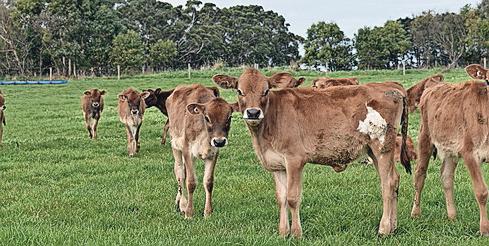
“We feel a sense of gratitude for the opportunities we had so now can we give something back.”
The retreat has an open plan with one bedroom, two bunk beds in a separate area if needed, open fire, a stone bath and a journal for people to share their stories.
It is available for people who have lost children from conception to 18 years old.
Since opening last November, the response has been overwhelming. There are often two bookings per week for between two and five days.
Forever Held is a not-for-profit foundation created to run the ongoing facility.
Sheree is joined by Jacinta Lenehan and Fiona Smith, who have also experienced loss,
“It makes them feel supported in their grief. The loss of a child can be such a hidden, silent pain.
“The guests appreciate that the sole purpose of this place is for parents who have experienced loss. They say there’s a certain sacredness to it.”
The broader block is used for young stock but it’s not a farm stay and there’s no interaction with the cows and calves. However, the tranquil surroundings and nearby creek are ideal for relaxing.
Hayden is a fourth-generation farmer. He returned to the land in 2009 after studying ag science at university and working for the DPI for four years.
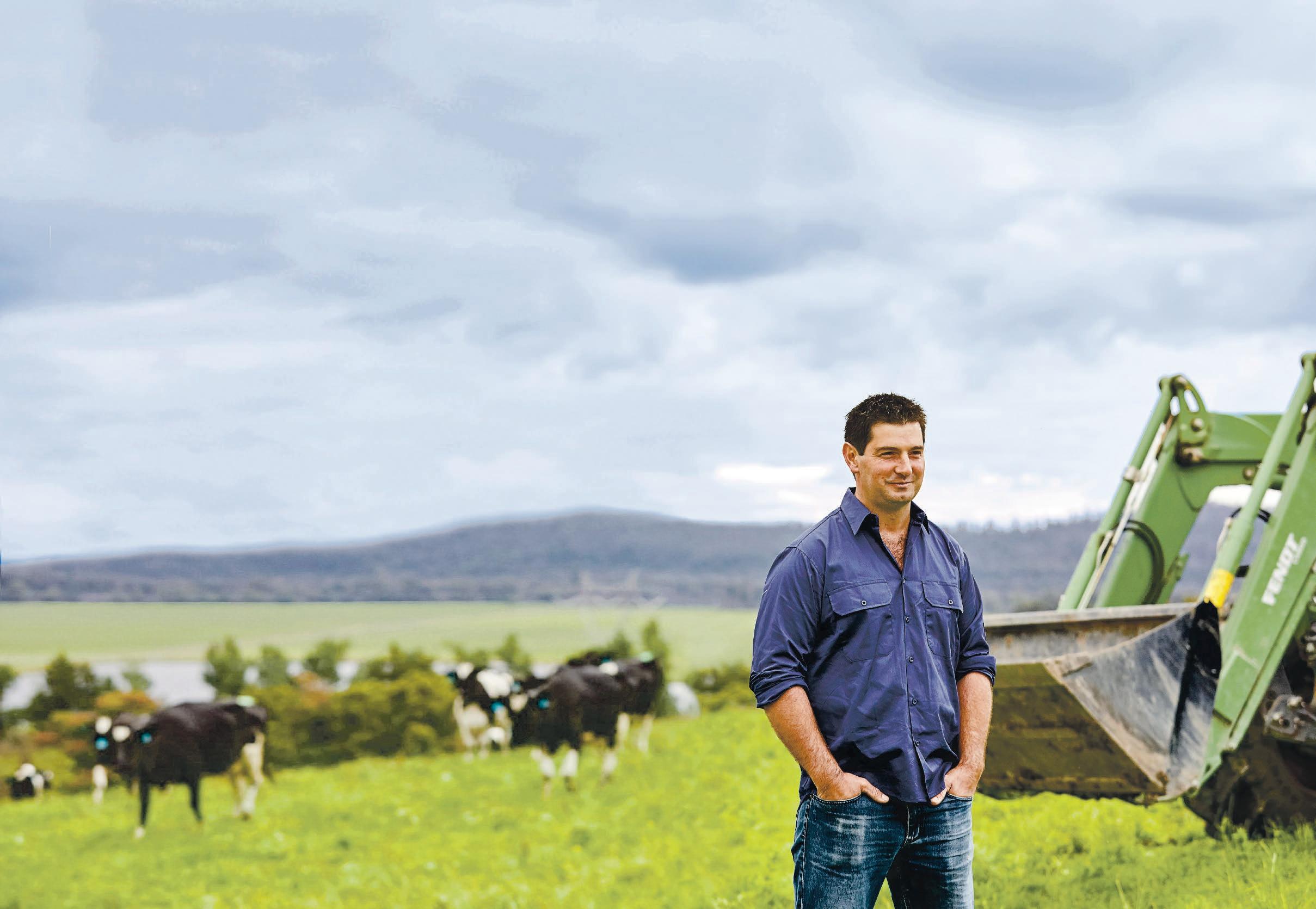
The home farm, settled by the Ballinger family in 1939, covers just over 230 hectares and has about half that again in out-paddocks.
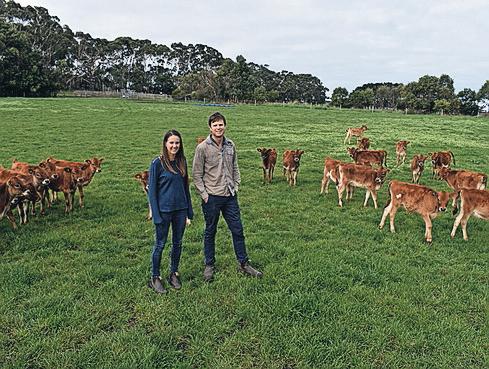
With the support of two full-time staff, they
annual rainfall, bought and leased more land, added solar power to the dairy and irrigation dam, built an underpass and planted many native shelter belts.
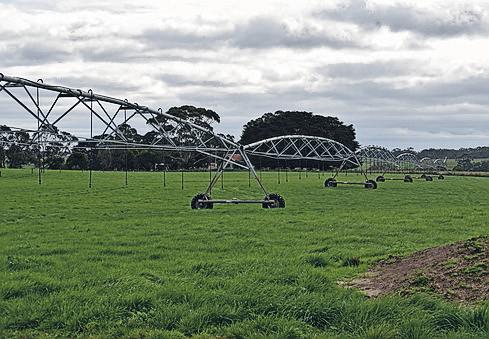
“We run a relatively simple business and the changes have been all about risk management and what we can put in place to make this farm more resilient,” Hayden said.
“We’ve got a lot of debt but it’s about how we manage that risk. There are things we can’t control but we can manage them.”
LIAM RYAN might be running against local convention when it comes to lactation periods, but his new system is hitting its goals.
A change from 300 to 400-day lactations has helped the Grassmere farmer to improve fertility and herd management efficiency.
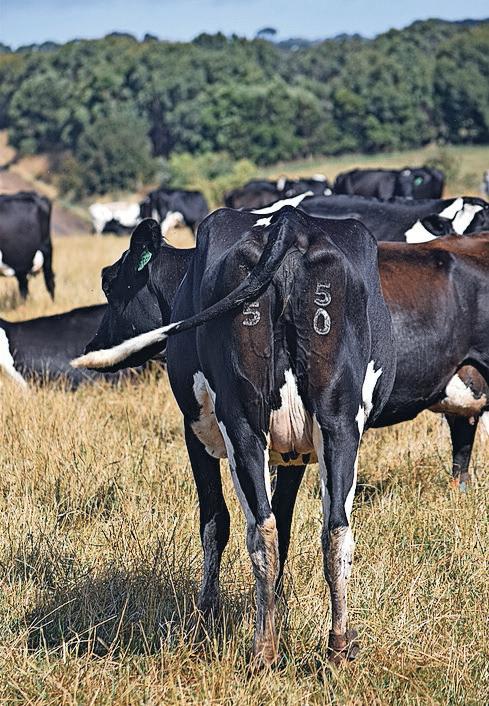
Liam has also moved from split calving in February-March and July-August to batch calving, that moves back three months each year.
While he isn’t aware of any other local farmers using 400-day lactations, Liam says the changes are working.
The Ryan family has been farming in the Grassmere area since 1942, with Liam starting in 2004, and converting the current home farm in 2007.
In 2013 Liam took over the business, Numeralla Dairy Co, and the following year bought his uncle’s farm, reuniting the original family property. He milks 650-700 cows on the main 404 hectare farm, supported by another 200ha for young stock and cropping.
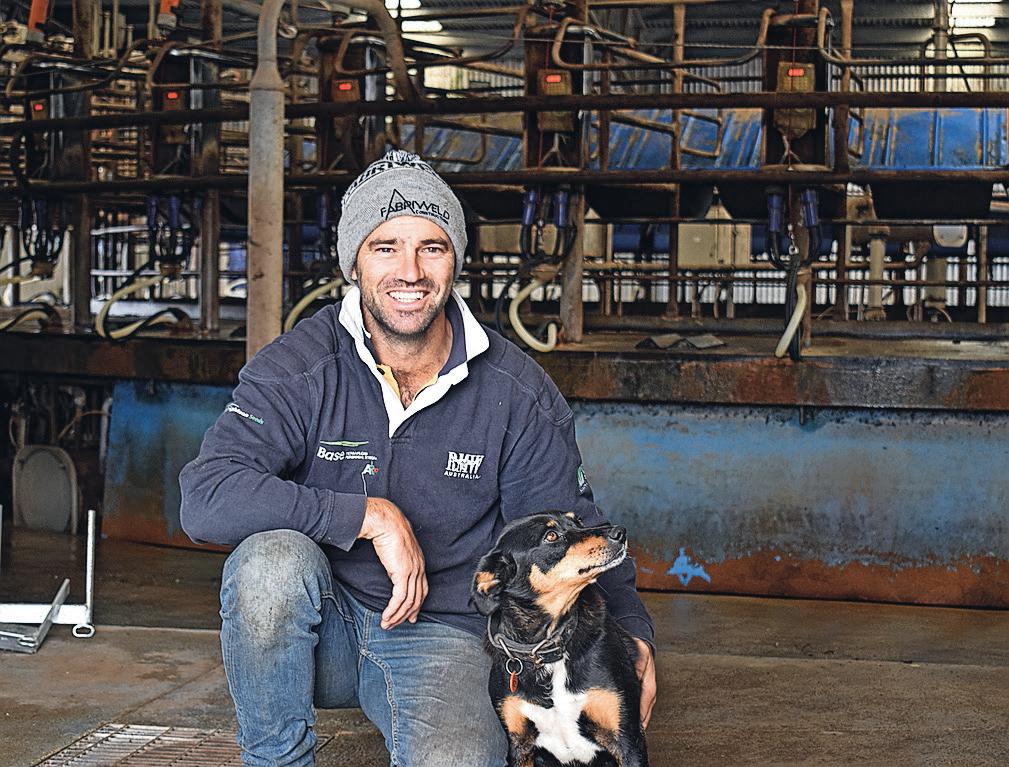
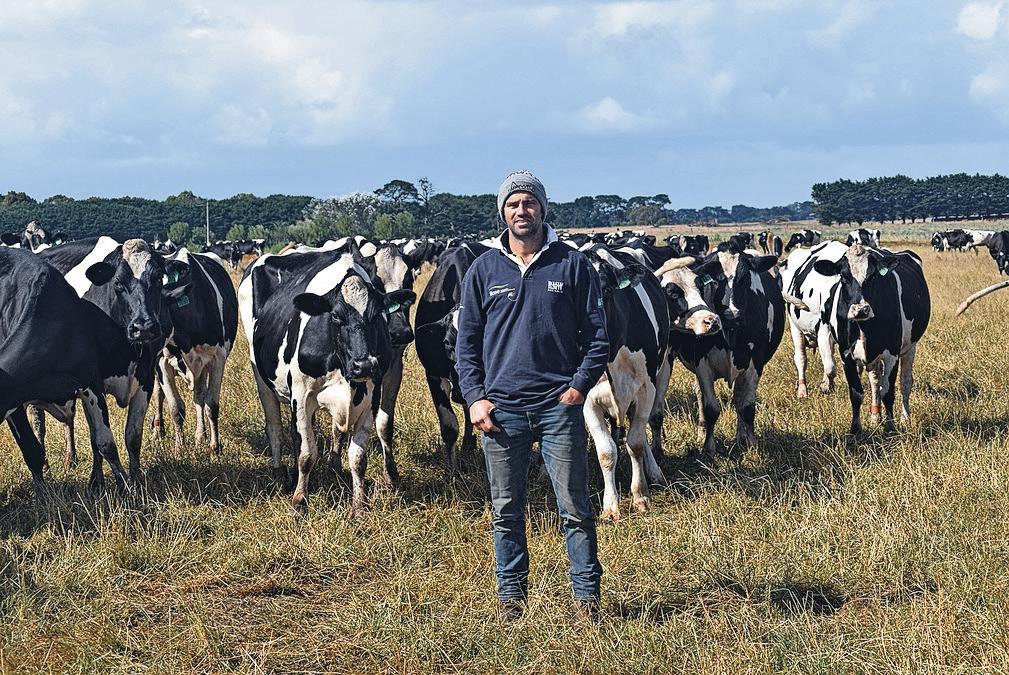
Liam came up with the new lactation system combined with a big increase in sexed semen as part of an overhaul to improve fertility and time management.
“We were having trouble getting cows in calf, particularly the spring-calving cows. They were working really hard doing a lot of milk and we were trying to join them but we were getting really poor results,” he said.
“The 400 days gives the cows more days open between calving and joining,” he said.
“It’s better for the cows and increases their opportunity to get in calf. It means the days open between calving and the mating start date for my last cow calved is the same as the early cows on a 300-day lactation.”
The change has led to a significantly better in-calf rate, a much lower replacement rate, more calves for the export market and greater genetic gain.
Liam has extended joining from 10 to 14 weeks and is achieving a 95-per cent in-calf rate, a substantial improvement on 80 per cent in the previous 10-week joining.
“On sexed semen, we’re getting better conception rates on the extended lactation than we were on conventional semen on a 300-day lactation.”
This year they are calving together for the first time and Liam expects the cows will peak higher because they’re better rested and carrying better condition, although there may be a trade-off with a slight reduction in the last 100 days of the lactation.
The herd previously averaged 9500 litres and 670kg/Ms in 300-day lactation. Liam is targeting 850kg/Ms under the new 400-day system.
Liam says the better in-calf rates make the change worthwhile.
“On a 300-day lactation, any cows that calve outside the first three weeks have a significantly reduced chance of calving back in that period the following year, she is effectively on her way to being carried over or sold,” he said.
“When our in-calf rate goes up, our replacement rate drops because we’re not selling cows because they’re not in-calf, and the number of replacements we can breed is massive because we’ve changed over to using three-quarters sexed semen.
“Instead of getting 25 to 30 per cent of our herd numbers in replacements, we’re getting two-thirds which means there are lots of excess for the export market.”
This year they had about 350 heifers born but only needed 120.
“There might be 50-80 that I know I don’t want, the rest get genomically tested,” Liam said.
“We go through that information and match that against what I know about the cows and then decide what I’m going to keep and the rest go to export.
“It can be a problem, because some of the heifers I’m selling I would really like to milk
but it has definitely created more options for me and as Dad likes to remind me — you can’t milk them all.”
And it’s not only about numbers; Liam says the genetic gain is huge because he’s breeding from what he wants to breed from.
“We’re getting better cows.”
Previously a mixed herd, it is now totally Friesian for their ability to put milk in the vat. The herd is ranked in the top two per cent in the country for BPI.
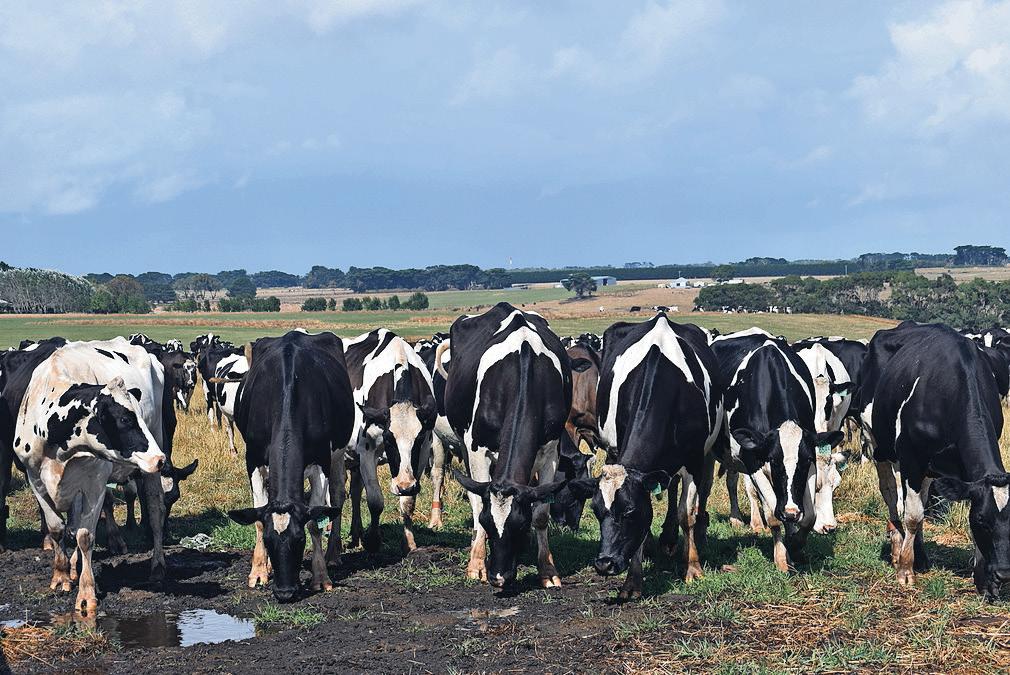
Liam said he chose 400 days because it would reset every five years and was easier from a management perspective.
“By doing it the way I have, the heifers calve at two-and-a-half years. If you extended it further, they would be older when they calve or if you did it shorter, you would have to calve them at less than two years of age.
“I’m not aware of anyone else doing 400-day lactations locally, though anyone who calves year-round would be pretty close to it, maybe 380,” he said.
“In US free-stall barns, the average lactation is 400 days.”
Liam, who has four full-time staff, says the new system is easier to manage.
“From a management point of view, it’s chaos when you’re calving for six or eight weeks, but then you get a six-month period
from when joining finishes to when the first group of cows are due to be dried off so you can roll cows around the farm and get other things done.
“With split calvings, we were always calving, joining, drying off.”
They calved together for the first time last July. Because Liam had two herds, one herd had to be carried around to catch up with the other.
“We had a pretty good year so they have peaked really well and this will be a good production year. In two years, we’re going to calve in January so if we get a hard summer and ordinary autumn, production won’t be as good, but because we’re not juggling two herds, it will be easier to plan for.”
In 2021 the farm was running up to 730 cows in two herds. Liam says the extra work and extra complexity wasn’t worth it.
This year they peaked at 680.
“I think one herd is better for us. It was interesting to try two herds for three seasons, but it just wasn’t efficient.”
Liam has loved cows all his life and admits nagging his father Basil to register the herd.
Liam has recently achieved a life-long goal by having a bull selected for the Genetics Australia team, and he hopes for big things for Numeralla A2P2 Illuminator.
Previously a mixed herd, it is now totally Friesian for their ability to put milk in the vat. The herd is ranked in the top two per cent in the country for BPI. Liam came up with the new lactation system combined with a big increase in sexed semen as part of an overhaul to improve fertility and time management. Liam Ryan has recently achieved a life-long goal by having a bull selected for the Genetics Australia team, and he hopes for big things for Numeralla A2P2 Illuminator.Using a combination of chopped forages, feed ingredients and pelleted feeds, blends provide a nutritional package that is convenient and easy to feed. Designed to be fed as a total mixed ration (TMR) or partial mixed ration (PMR), the blends remove the need for mixing facilities on the farm.

Transition Blend A total mixed ration (TMR) specifically formulated to provide the correct nutrient balance for high performing dairy cows in the transition period. The ration will cover energy, protein, mineral and vitamin requirements along with appropriate DCAD levels. Feed to your springing herd for 21 days up to calving. Recommended intake varies according to cow size – typically 12 to 18 kg per cow per day.
Heifer Blend A flexible ration for either young cattle as a TMR or partial mixed ration (PMR) or lactating cattle as a PMR. Feed rates will vary accordingly based on requirements.
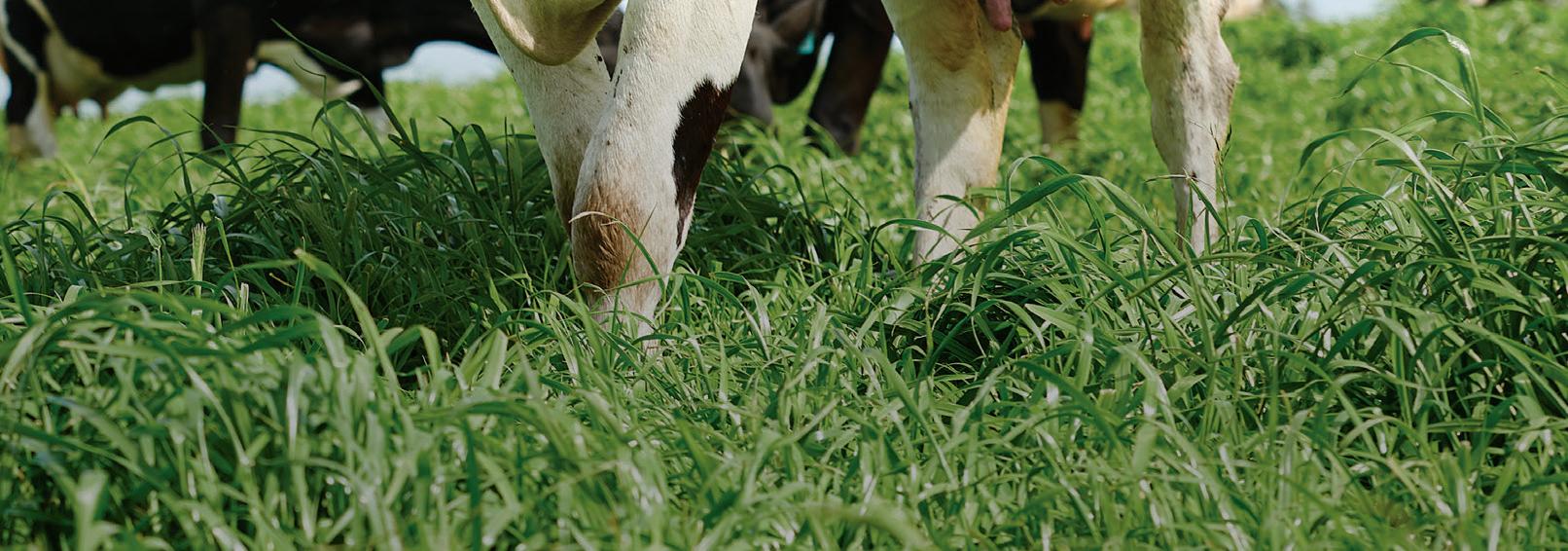
Seasonal Milking Blend PMR rations designed to be used in conjunction with other forages and concentrates at a variable feed rate. Feed rates will vary accordingly based on requirements.
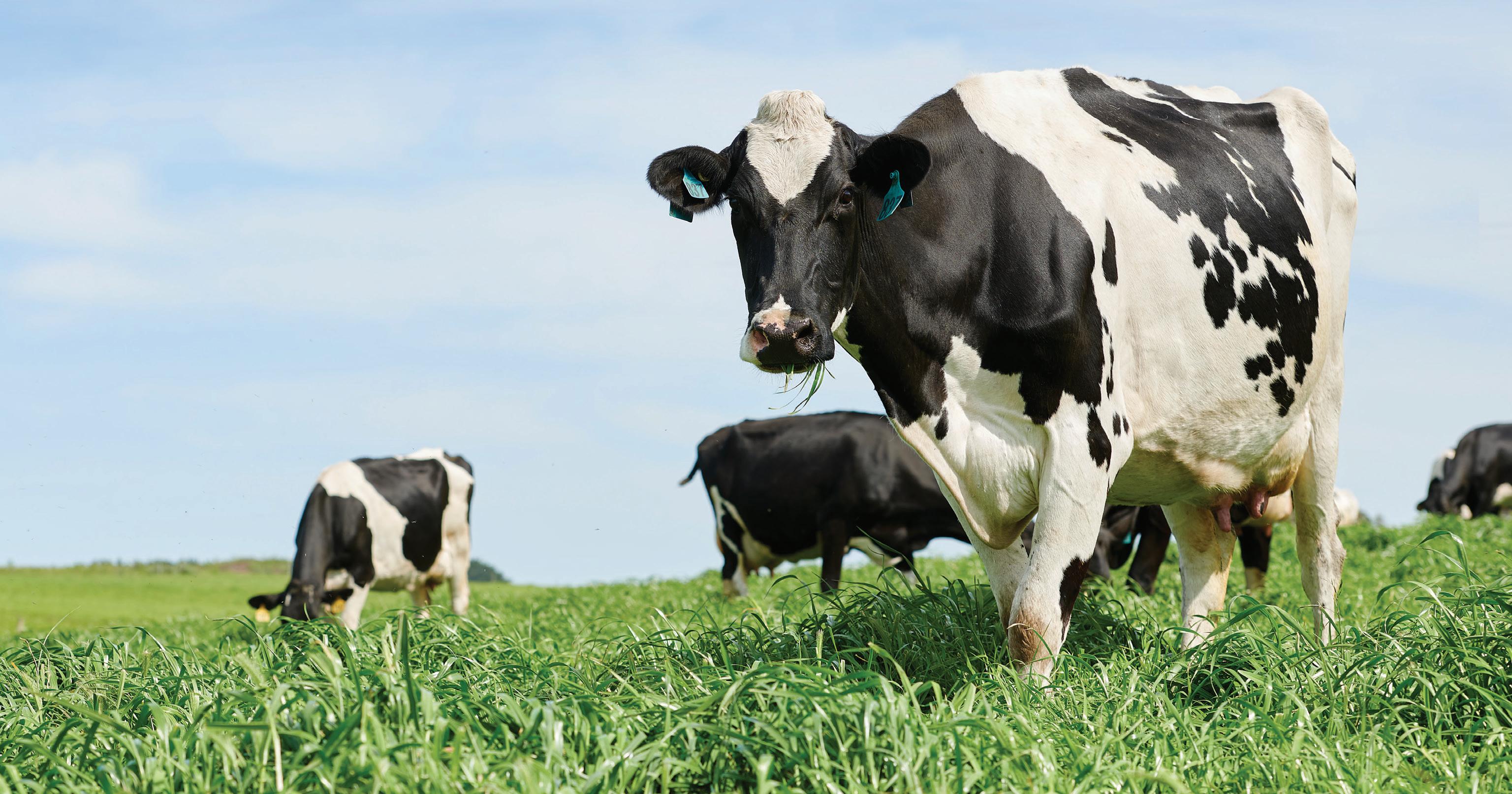
Dry Cow Blend Designed to maintain body condition and cover late pregnancy requirements from drying off until 21 days before calving. This blend can be used as a TMR or PMR.
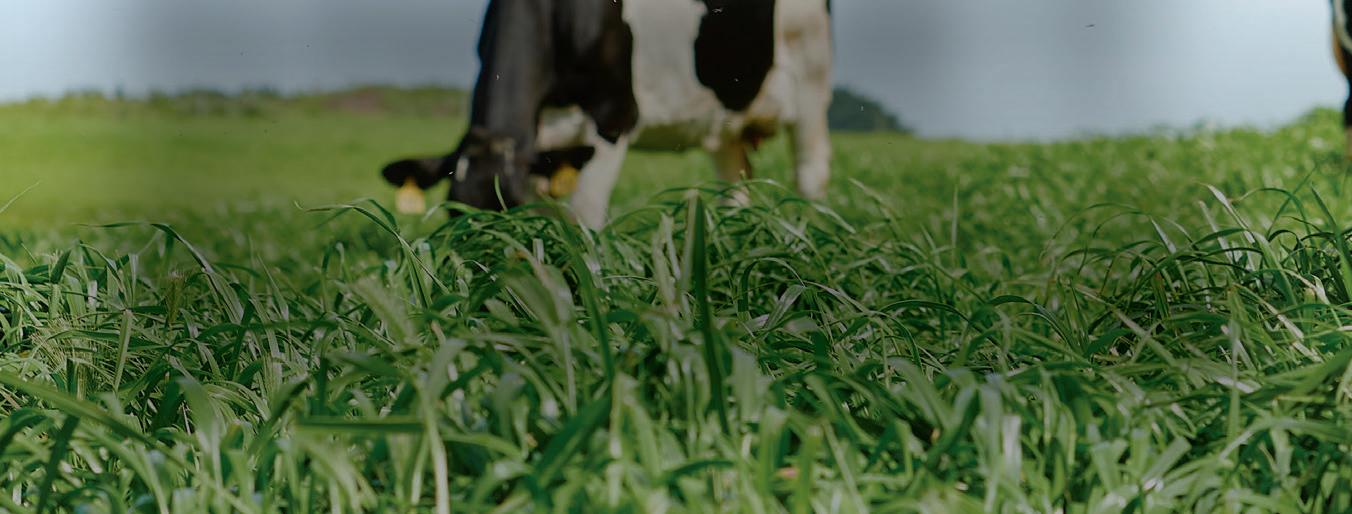
Contact our dairy blend expert today to obtain customised blend today.

Western Victoria (Terang)
1800 100 151
Terang.Sales@ridley.com.au www.ridley.com.au

ALL

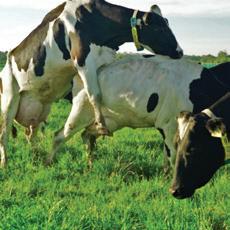




ABOARD FOR

